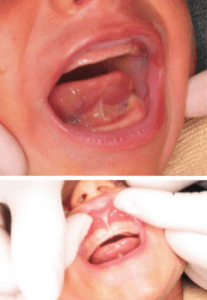
Leslie Haller performs a frenectomy
using a Light Scalpel CO2 laser.
Try this test: Stick your tongue out, straight out, as far as you can. Are you able to hold it in a straight line? If your tongue curls down toward your chin, you might be part of the 5 to 10 percent of the population born with tongue-tie, or ankyloglossia.
Tongue-tie occurs when an unusually short, thick or tight band of tissue, called the lingual frenulum, tethers the bottom of the tongue to the floor of the mouth, keeping the tongue from moving freely. The condition sometimes is hereditary, but not always, and is more prevalent in males.
Signs of a tongue-tie are visible from birth and may interfere with breastfeeding. If tongue-tie is not detected by pediatricians or NICU specialists, both mother and infant may experience distress during the nursing process as baby fights and bites to pull milk. Babies with tongue-tie also may struggle with reflux or colic and are uncomfortable sleeping on their backs.This adds an extra layer of worry for parents since experts warn that babies should not sleep on their stomachs. In more extreme cases, infants will not gain weight as quickly as they should. As a result, parents usually will be encouraged to supplement their baby’s diet with formula.

have problems with breastfeeding
and experience reflux and colic.
“If left untreated, toddlers with tongue-tie may have speech problems,” said Leslie Haller, DMD, of Tongue Tie South Florida, who specializes in the treatment of the condition. “They either will not speak at all or will avoid certain words.”
Words like “love” or “rain” may be difficult for the child to say correctly. Speech therapists who lack knowledge of the condition may spend years working with a child when a short and simple procedure is all that is needed to fix the problem, Dr. Haller says. Adults who live with tongue-tie tend to have chronic head- aches and pain in their sinuses, necks and shoulders.
To treat tongue-tie, Dr. Heller performs a frenectomy using a Light Scalpel CO2 laser. She is certified by the American Board of Laser Surgery, indicating she has completed many hours of training and more than 100 cases.
In the past, a frenectomy required general anesthesia, which is one reason some pediatricians may have been reluctant to recommend the procedure. However, with today’s medical advances, a frenectomy takes just ten minutes using the CO2 laser and requires no general anesthesia. The procedure is virtually risk-free, and recovery takes about one week.
“While this procedure is very safe, diagnosis and treatment are complicated,” said Dr. Haller. “It’s important to visit a trained and experienced provider.’
In hopes of spreading awareness of the condition and the modern laser treatment, Dr. Haller is happy to speak with pediatricians or other medical professionals who have questions or want to learn more.
For more information, call 786- 567-8274 or visit www.tonguetiesouthflorida.com.






